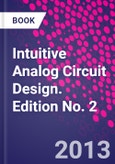Intuitive Analog Circuit Design outlines ways of thinking about analog circuits and systems that let you develop a feel for what a good, working analog circuit design should be. This book reflects author Marc Thompson's 30 years of experience designing analog and power electronics circuits and teaching graduate-level analog circuit design, and is the ideal reference for anyone who needs a straightforward introduction to the subject.
In this book, Dr. Thompson describes intuitive and "back-of-the-envelope" techniques for designing and analyzing analog circuits, including transistor amplifiers (CMOS, JFET, and bipolar), transistor switching, noise in analog circuits, thermal circuit design, magnetic circuit design, and control systems. The application of some simple rules of thumb and design techniques is the first step in developing an intuitive understanding of the behavior of complex electrical systems.
Introducing analog circuit design with a minimum of mathematics, this book uses numerous real-world examples to help you make the transition to analog design. The second edition is an ideal introductory text for anyone new to the area of analog circuit design.
Please Note: This is an On Demand product, delivery may take up to 11 working days after payment has been received.
Table of Contents
Introduction and motivation
Signal processing basics
Diode physics
Bipolar transistor models
Basic bipolar transistor amplifiers
Bandwidth estimation techniques
Advanced transistor amplifier techniques
High gain bipolar amplifiers
Introduction to MOSFET devises
Bipolar transistor switching
Review of feedback models
Basic operational amplifier topologies and a case study
Review of current feedback operational amplifiers
Analog low-pass filters
Review of passive components
Other useful design techniques and loose ends
Authors
Marc Thompson Thompson Consulting, Inc. MA, USA.Worcester Polytechnic Institute, MA, USA..
Dr. Thompson specializes in custom R/D, analysis, and failure investigations into multi-disciplinary electrical, magnetic, electromechanical and electronic systems at Thompson Consulting, Inc. (Harvard MA).
The author is also Teaching Professor of Electrical and Computer Engineering at Worcester Polytechnic Institute. He teaches graduate-level and undergraduate seminars in analog, power quality, power electronics, electomechanics, electric motors, rotating machinery, and power distribution for high-tech companies. He has taught for University of Wisconsin-Madison, covering classes in electric motors, electromechanical systems, power electronics and magnetic design.








